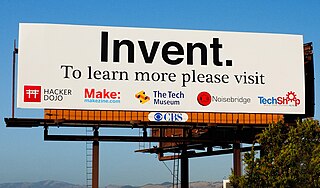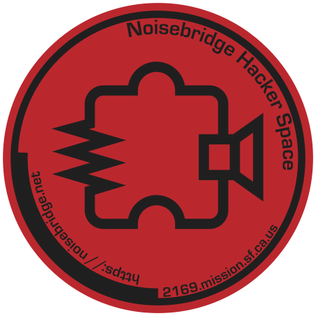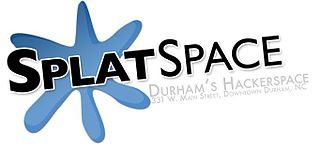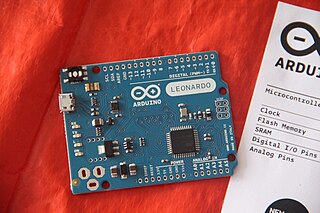
Jaycar, formerly Jaycar Electronics, is an Australia-based retailer dealing in electronic components and related products for electronics enthusiasts. The company owns around 110 stores across Australia and New Zealand, and also sells its products online in the UK and US. It was founded in 1981 by Gary Johnston, who remained managing director until his death in 2021.
Make is an American magazine published by Make: Community LLC which focuses on Do It Yourself (DIY) and/or Do It With Others (DIWO) projects involving computers, electronics, metalworking, robotics, woodworking and other disciplines. The magazine is marketed to people who enjoyed making things and features complex projects which can often be completed with cheap materials, including household items. Make is considered "a central organ of the maker movement".

Arduino is an open-source hardware and software company, project and user community that designs and manufactures single-board microcontrollers and microcontroller kits for building digital devices. Its hardware products are licensed under a CC-BY-SA license, while software is licensed under the GNU Lesser General Public License (LGPL) or the GNU General Public License (GPL), permitting the manufacture of Arduino boards and software distribution by anyone. Arduino boards are available commercially from the official website or through authorized distributors.

Mitch Altman is a San Francisco-based hacker and inventor, best known for inventing TV-B-Gone, as featured speaker at hacker conferences, as international expert on the hackerspace movement, and for teaching introductory electronics workshops. He is also Chief Scientist and CEO of Cornfield Electronics.
The Evil Genius book series is a collection of paperback publications published by McGraw-Hill/TAB Electronics.

A hackerspace is a community-operated, often "not for profit", workspace where people with common interests, such as computers, machining, technology, science, digital art, or electronic art, can meet, socialize, and collaborate. Hackerspaces are comparable to other community-operated spaces with similar aims and mechanisms such as Fab Lab, men's sheds, and commercial "for-profit" companies.
Newcastle ScienceFest is a 10-day event at venues across NewcastleGateshead, with the principal aim of increasing the North East’s enthusiasm for science and encouraging young people to consider a career in this area.
TOG is a hackerspace in Dublin, Ireland. tóg is a word in the Irish language; one of its meanings is 'to build or construct'.

Pumping Station: One is a non-profit hackerspace/makerspace in Chicago, Illinois. It's modeled after similar organizations located in the United States and Europe. The facilities consists of approximately 11,000 square feet (1,000 m2) of shop, workspace, and lounge areas.

The maker culture is a contemporary subculture representing a technology-based extension of DIY culture that intersects with hardware-oriented parts of hacker culture and revels in the creation of new devices as well as tinkering with existing ones. The maker culture in general supports open-source hardware. Typical interests enjoyed by the maker culture include engineering-oriented pursuits such as electronics, robotics, 3-D printing, and the use of computer numeric control tools, as well as more traditional activities such as metalworking, woodworking, and, mainly, its predecessor, traditional arts and crafts.

Noisebridge is an anarchistic hackerspace located in San Francisco, inspired by European hackerspaces Metalab and c-base in Berlin. It is a registered non-profit California corporation, with IRS 501(c)(3) charitable status. It describes itself as "a space for sharing, creation, collaboration, research, development, mentoring, and learning" and outside of its headquarters forms a wider community around the world. It was organized in 2007 and has had permanent facilities since 2008.

Baltimore Hackerspace is a hackerspace, sometimes called a makerspace, located in Baltimore, Maryland. Its creation has been inspired and modeled after the many other Hackerspaces around the United States and Europe.

Open Shed was a hackerspace in Penzance, Cornwall. Founded in 2012 it provided space for people working in the tech community to meet and work, workshops for electronics and light engineering projects, bike kitchen, events space, and an informal café. Run as a social enterprise, many of its members were self-employed.

Chaosdorf is a hackspace operated by non-profit association Chaos Computer Club Düsseldorf / Chaosdorf e.V. in the city of Düsseldorf, Germany. It is Düsseldorf’s Chaos Computer Club chapter.

Makey Makey: An Invention Kit for Everyone is an invention kit designed to connect everyday objects to computer keys. Using a circuit board, alligator clips, and a USB cable, the toy uses closed loop electrical signals to send the computer either a keyboard stroke or mouse click signal. This function allows the Makey Makey to work with any computer program or webpage that accepts keyboard or mouse click inputs and then it will work.
Xinchejian is the first hackerspace in China. It was founded in 2010 by David Li, Ricky Ng-Adam, and Min Lin Hsieh in Shanghai, inspired by hackerspaces in the West and the Shanzhai culture of China. Xinchejian is registered as a company, but is run as a non-profit organization, and managed by volunteers.

SplatSpace is a multidisciplinary collaborative workspace located in Durham, North Carolina. SplatSpace, also known as SplatSpace: Durham's HackerSpace, and previously as Durham's MakerSpace is a 501(c)(3) non-profit organization composed primarily of people from the local maker community. Classifiable as a Hackerspace or Makerspace, the majority of activities members are involved in typically revolve around technology, however, traditional skills such as wood-working, metal working, textiles, arts and crafts are represented as well.
Makers UPV is a non-profit community of students from the Universitat Politècnica of València founded in April 2013, whose objective is to enhance the learning experience of students by adding a practical approach based on "experiential learning", Do it yourself and the Maker Culture. Through projects, competitions and workshops taught by the students with special abilities, the community is retrofitted and grows.

Comparison of Single-board microcontrollers excluding Single-board computers















